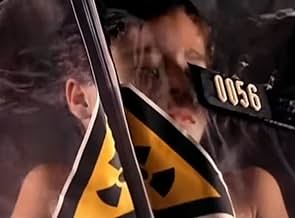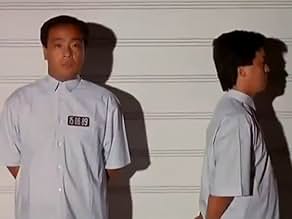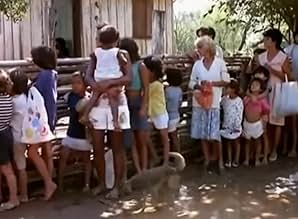VALUTAZIONE IMDb
8,5/10
6898
LA TUA VALUTAZIONE
Aggiungi una trama nella tua linguaA tomato is planted, harvested, transported and sold in a supermarket, but it rots and ends up in the trash. The film follows it to its true end, all to make clear the difference between tom... Leggi tuttoA tomato is planted, harvested, transported and sold in a supermarket, but it rots and ends up in the trash. The film follows it to its true end, all to make clear the difference between tomatoes, pigs, and human beings.A tomato is planted, harvested, transported and sold in a supermarket, but it rots and ends up in the trash. The film follows it to its true end, all to make clear the difference between tomatoes, pigs, and human beings.
- Regia
- Sceneggiatura
- Star
- Premi
- 4 vittorie totali
Recensioni in evidenza
10jordani
Jorge Furtado needed no more than 13 minutes to prove his theory "there's no God", showed in the beginning of the movie. This movie is as raw as fresh meat and cuts like a knife. No more words to describe. You must see it for yourself. Believe me, after you watch this movie you won't forget it never more.
Saw this documentary short subject in my World Society course at UC Santa Cruz. It's about capitalism, told through the story of a tomato. But, thinking back on it, it was much more than just that tomato, that went into the making of the family's dinner, which was bought with money, which was acquired through the mother's perfume sales, which is an alcohol-based topical fragrance oil. If you're wondering what I'm talking about, this is how the film is paced. It is the very reason the word "Tangential" was created. Furtado is so crafty at taking you to places you never think you'll go; from painfully hilarious irony (the monty python-esque first 5 minutes), to head-battering shock (the history of "the second");just by mentioning a single word, you could travel from a dollar bill to a pile of emaciated bodies, within a matter of seconds. And none of the connections are far-fetched. His story is based on the theory of six degrees of separation, and how he arrives at those final, latent images of haunting truth is a trip that must be taken.
I was recently compiling a list of my favorite movies of 2000, and the best films I saw were the reissues of "The Exorcist" and "Blood Simple", and this, a 15 minute documentary about capitalism. Very weird, but it is true. If I ever get the chance to see this again, I will relish every second of it as if it were the first time. And if you are a student, you should check your campus library for "Ilha das flores", because it is amazing.
I was recently compiling a list of my favorite movies of 2000, and the best films I saw were the reissues of "The Exorcist" and "Blood Simple", and this, a 15 minute documentary about capitalism. Very weird, but it is true. If I ever get the chance to see this again, I will relish every second of it as if it were the first time. And if you are a student, you should check your campus library for "Ilha das flores", because it is amazing.
10huineman
Very seldom is one given the opportunity to watch a documentary like Ilha das Flores. It is less a TV product than an essay not written but filmed, and well filmed indeed. The ideas displayed throughout barely quarter an hour are so many and so profound that you might need more than one view to assimilate them all; but the script is so agile that you will never grow bored. Instead, even if you are not in the mood for documentaries at the beginning, will find yourself deeply interested in this humble production within minutes, if not seconds. But remember, you are not dealing with an entertainment product but with one of the best lessons of ethics you might come across ever. Anyway, that you will realize for sure at the end of the film, when its ideas, lingering in your head, will keep you pensive for long.
This short is a fine example of people with something crucial to say, having to bend to commercial whims of entertainment in order to hold the audience's attention span long enough to get the message across. It is remarkably witty, and runs at a fanatical pace. The jokes cause a smile, but when the holocaust clips arise, we get the clue that there are weighty matters at stake here. People need to see films like this. Remarkably effective.
Here's a work that definitely proves how exciting and questioning a short movie picture can be.
Acting as a director, writer and producer, Jorge Furtado couragely aims a dazzling machinegun at issues as assorted as religion, Holocaust, Brazilian government, poverty, capitalism, and how human intelligence has been used throughout the ages.
Using a dialectical method, and narrating the story in a way that "even a Martian would understand", in the words of the author, the film forges a real cinematographical theorem of Brazilian deplorable situation, borrowing as the stage a neighbourhood in the city of Porto Alegre (one of Brazil's most developed ones, by the way). The degrading scenario, however, would apply to any community on the world in which the effects of money (or its lack) on the lives of its inhabitants are more visible.
In the movie's touching final take, Furtado destroys the bourgeois concept of Freedom, quoting a line from one of Brazil's greatest poetesses, Cecilia Meirelles, and leaves us wondering whether modern 'civilisation' is as far as the human intellect can take us.
Acting as a director, writer and producer, Jorge Furtado couragely aims a dazzling machinegun at issues as assorted as religion, Holocaust, Brazilian government, poverty, capitalism, and how human intelligence has been used throughout the ages.
Using a dialectical method, and narrating the story in a way that "even a Martian would understand", in the words of the author, the film forges a real cinematographical theorem of Brazilian deplorable situation, borrowing as the stage a neighbourhood in the city of Porto Alegre (one of Brazil's most developed ones, by the way). The degrading scenario, however, would apply to any community on the world in which the effects of money (or its lack) on the lives of its inhabitants are more visible.
In the movie's touching final take, Furtado destroys the bourgeois concept of Freedom, quoting a line from one of Brazil's greatest poetesses, Cecilia Meirelles, and leaves us wondering whether modern 'civilisation' is as far as the human intellect can take us.
Lo sapevi?
- QuizThe short opens with three short sentences on screen: "Este filme não é um filme de ficção. Existe um lugar chamado Ilha das Flores. Deus não existe." [This film is not a work of fiction. There is a place named Island of Flowers. God does not exist.]
- ConnessioniFeatures I campi di concentramento nazisti (1945)
I più visti
Accedi per valutare e creare un elenco di titoli salvati per ottenere consigli personalizzati
Dettagli
- Data di uscita
- Paese di origine
- Lingua
- Celebre anche come
- Isle of Flowers
- Luoghi delle riprese
- Ilha das Flores, Porto Alegre, Rio Grande do Sul, Brasile(30º 12' 30" S, 51º 11' 21" W)
- Azienda produttrice
- Vedi altri crediti dell’azienda su IMDbPro
- Tempo di esecuzione
- 13min
- Mix di suoni
- Proporzioni
- 1.37 : 1
Contribuisci a questa pagina
Suggerisci una modifica o aggiungi i contenuti mancanti




















